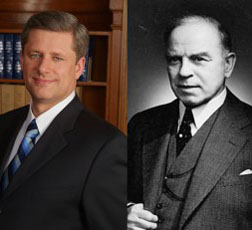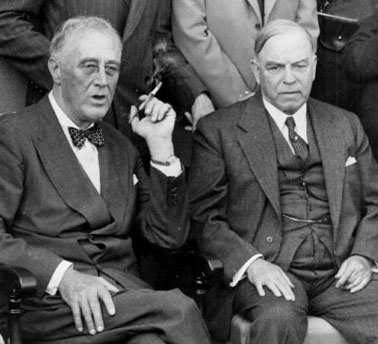Stephen Harper and Mackenzie King .. bad joke or nightmare ????
Nov 27th, 2014 | By Randall White | Category: In Brief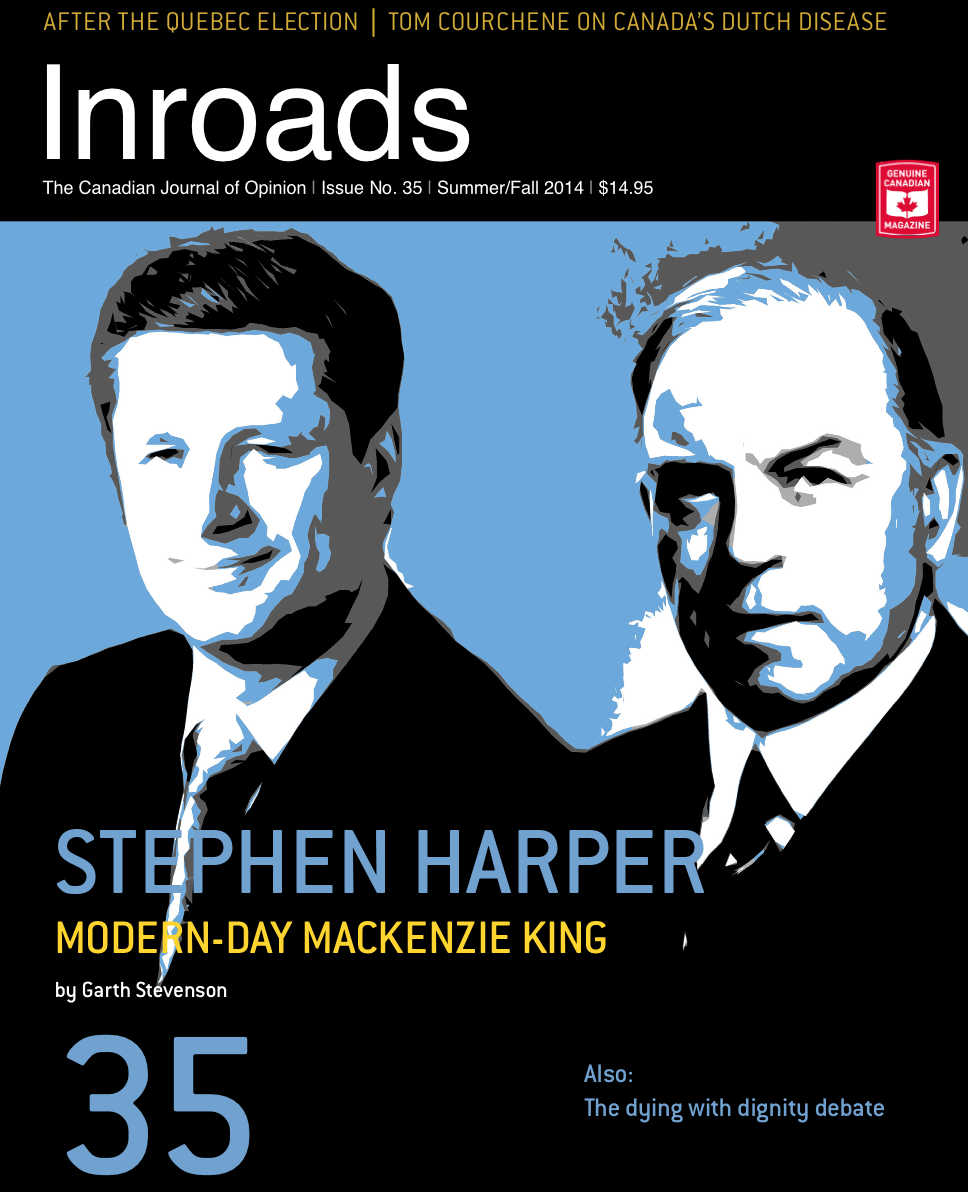
In the Summer / Fall 2014 issue of the Canadian journal of opnion, Inroads, political scientist Garth Stevenson also broached the prospect that “of the 21 prime ministers who preceded him, the one that Harper most resembles is William Lyon Mackenzie King.”
Whatever else, Stephen Harper has become the kind of opponent you worry about. He has now been prime minister of Canada since early in 2006. He is up for re-election this coming 2015. He has  obvious major flaws. He lacks constructive wisdom about the country. But you fear he may have other, lower talents that could keep him in office almost forever.
My own deepest fear of this sort is that history may finally see Stephen Harper as a kind of right-wing-family-man clone of William Lyon Mackenzie King – the longest-serving federal prime minister in Canadian history to date (1921—1926, 1926—1930, 1935—1948). If this is true we may have many more years of PM Harper to endure. And it does not calm my fear to discover that the political scientist Garth Stevenson has also recently explored the prospect that “Skilful, cautious and uninspiring, Stephen Harper resembles Canada’s longest-serving prime minister,” in an article called “The Mackenzie King of our time.”
Canadians of my generation have learned about Mackenzie King mostly from books, with occasional help from radio, TV, and vague oral history. When he retired in 1948, to take just the example I know best, I was only three years old. The first Canadian prime minister I have any active memory of is Mackenzie King’s successor, Louis St. Laurent.
I nonetheless count myself among those fortunate enough to have discovered such national treasures as Bruce Hutchison’s The Incredible Canadian : A candid portrait of Mackenzie King – first published in 1952, and then republished in 1970, and again in 2010 (and in this last case with a new introduction by Vaughn Palmer of the Vancouver Sun) . For a more recent  “King biography for our times” today see Winnipeg author Allan Levine’s King: A Life Guided by the Hand of Destiny, first published in 2011.
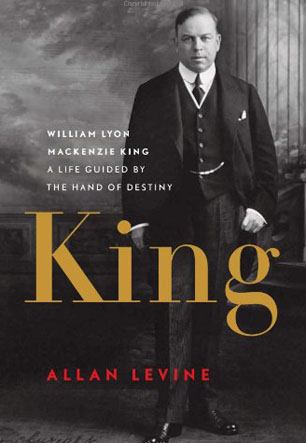 My own ultimate conclusion is that, again whatever else (and there is quite a lot that can be fit into this box), William Lyon Mackenzie King was and still is an unusually interesting Canadian politician. If you work even just a little at acquiring some deeper sense of who he was, the  mysteries of Rob and Doug Ford seem less mysterious. Like “Trailer Park Boys.” Or the Mackenzie Brothers on SCTV.  (Or almost any character of Martin Short’s?)
My own ultimate conclusion is that, again whatever else (and there is quite a lot that can be fit into this box), William Lyon Mackenzie King was and still is an unusually interesting Canadian politician. If you work even just a little at acquiring some deeper sense of who he was, the  mysteries of Rob and Doug Ford seem less mysterious. Like “Trailer Park Boys.” Or the Mackenzie Brothers on SCTV.  (Or almost any character of Martin Short’s?)
Canada then and now, that is to say, was and still is a uniquely crazy place. And Mackenzie King was – in the words of an initial critic but ultimate warm admirer, writing in the summer of 1948, on the great man’s retirement : “the representative Canadian, the typical Canadian, the essential Canadian, the ideal Canadian, the Canadian as he exists in the mind of God.” Now … what about Stephen Harper? Is he anything like this at all?
1. More Mackenzie King background
A few further background details about the historical “comparator” are probably in order. To start with the one I find most intriguing myself, William Lyon Mackenzie King was the grandson of William Lyon Mackenzie, leader of the failed but influential Upper Canada Rebellion of 1837.
More exactly, Mackenzie King’s mother, Isabella Grace Mackenzie, was William Lyon Mackenzie’s daughter. Mackenzie King’s father, John King, was a lawyer in what is now Kitchener, Ontario, and later a professor at Osgoode Hall Law School in Toronto.
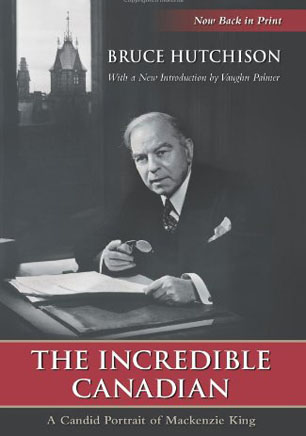 One of the strange things about Mackenzie King (“kinda creepy,” Allan Levine says) is that he remained deeply attached to his mother, more or less throughout his life (1874—1950). He never married, and he continued to communicate with Isabella Grace Mackenzie through spiritual mediums after her death. On occasion he sought spiritualist political advice as prime minister.
One of the strange things about Mackenzie King (“kinda creepy,” Allan Levine says) is that he remained deeply attached to his mother, more or less throughout his life (1874—1950). He never married, and he continued to communicate with Isabella Grace Mackenzie through spiritual mediums after her death. On occasion he sought spiritualist political advice as prime minister.
At the same time, William Lyon Mackenzie King earned both an MA in political economy from Harvard University, and a PhD from the same illustrious institution, for a dissertation on  “Oriental Immigration to Canada.” (King’s earlier 20th century view of this matter would not make sense for Canada in the 21st century. And this is just one thing that fits into the crowded whatever-else box.)
Before he became an elected politician in 1908, Â Mackenzie King served in the fledgling early Canadian public service in Ottawa, as a new deputy minister of labour. Â After he lost this first seat in the federal parliament in 1911, he worked as a director of the Rockefeller Foundation in New York City, heading the foundation’s new Department of Industrial Research, from 1914 until 1918. (Also the dates of the First World War! Which the USA did not join until 1917.)
Politically, Mackenzie King followed the party whose most radical democratic wing had once been occupied by his grandfather – variously known as the Great Reformers, Clear Grits, Les Rouges, etc, all finally rolling into the Liberal Party of Canada after the 1867 confederation. Inside the party Mackenzie King was an anglophone Laurier loyalist – a faithful follower of the confederation’s first French Canadian prime minister, Wilfrid Laurier (1896-1911).
2. PM Harper and Mackenzie King today … Â Yes ????
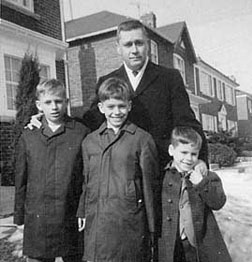
Young Stephen Harper (l) with brothers Grant (centre) and Robert, and their father, Joseph, in front of the family’s first Toronto home in Leaside. Courtesy Laureen Teskey Harper.
After Laurier’s death, William Lyon Mackenzie King won the leadership of the Liberal Party of Canada at an Ottawa convention in August 1919. Â He first became prime minister of Canada when his Liberals won a minority government, in the federal election of December 6, 1921.
The rest as they say is history. And if you want to pursue it even just a little try : “William Lyon Mackenzie King … From Wikipedia, the free encyclopedia” ; “Allan Gregg interviews Allan Levine on Mackenzie King, TVO” ; “Longest-serving prime minister King ‘the whole crazy package’ … Â Local author brings to life inner thoughts of dull but eccentric leader” ; and “The Mackenzie King of our time … Â Skilful, cautious and uninspiring, Stephen Harper resembles Canada’s longest-serving prime minister,” Â by Garth Stevenson.
What I’m most interested in right here and now is the question of just how good a fit there actually is between William Lyon Mackenzie King, Â longest-serving federal prime minister in Canadian history to date (1921—1926, 1926—1930, 1935—1948) and Stephen Harper (2006—20??)
The first obvious thing to say is that there clearly is some kind of similarity between these two Canadian prime ministers, then and now. (Garth Stevenson’s article on the subject is itself some kind of proof.) And whatever the similarity is exactly probably does draw on certain features of Canadian political culture that have comparatively deep roots – but that also seem to be almost regularly renewed by recurring present-day trends.
Or, for at least a few hundred years now, the aboriginal home and native land of Canada has been attracting certain kinds of migrants from other places – from the standpoint of character or personality, independent of such things as “ethnic origin,” sexual preference, religion, and so forth. And, despite all the outward changes in superficial appearances, it is still attracting these same kinds of migrants today from all around the world.
Both Mackenzie King and Stephen Harper similarly illustrate what might be called a Canadian type that nowadays has representatives from virtually everywhere. Such descriptions as “longest serving”, Â “dull but eccentric leader,” and “skilful, cautious and uninspiring” are to the point.
So is Stephen Harper’s quip that he can’t get even his friends to like him. Or the one piece of oral history I’ve heard about Mackenzie King that sticks in my mind : “No one ever admitted to actually voting for him.”
The poem that the Montreal lawyer Frank Scott wrote on Mackenzie King’s death may have some relevance here as well. I’m thinking in particular of the last two stanzas : “Truly he will be remembered / Wherever men honour ingenuity, / Ambiguity, inactivity, and political longevity. // Let us raise up a temple / To the cult of mediocrity, / Do nothing by halves / Which can be done by quarters.”
3. PM Harper and Mackenzie King today … Â No ????
In the very end, it does seem to me that, for all his faults, William Lyon Mackenzie King had a few great virtues in and for the Canada of his time. And I don’t find any similar case for Stephen Harper today at all convincing myself.
The deciding thing for me right now in this case has been a quick exercise involving one of the more intriguing observers of Mackenzie King’s career as it happened, the historian and political journalist Frank Underhill (1889—1971).
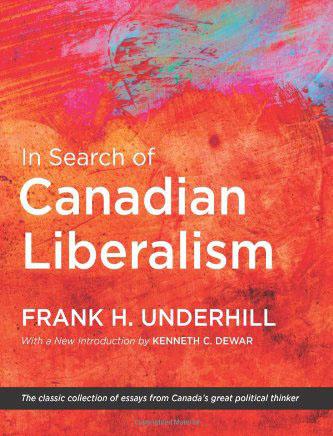 Underhill began his career as a great critic of Mackenzie King, and an ardent supporter of of the old CCF predecessor of today’s New Democratic Party. He ended as a somewhat reluctant admirer of Mr.King – and a man In Search of Canadian Liberalism. (As a collection of his essays on Canadian political history  first published in 1960 was called. It was just recently republished, in the summer of 2013.)
Underhill began his career as a great critic of Mackenzie King, and an ardent supporter of of the old CCF predecessor of today’s New Democratic Party. He ended as a somewhat reluctant admirer of Mr.King – and a man In Search of Canadian Liberalism. (As a collection of his essays on Canadian political history  first published in 1960 was called. It was just recently republished, in the summer of 2013.)
Here are some of Frank Underhill’s thoughts about Mackenzie King, that I don’t think make equal sense for Mr. Harper :
* “Evidently Mr. King meets the needs of the Canadian people much more satisfactorily than we and other critics have been willing in the past to admit … His statesmanship has been a more subtly accurate, a more flexibly adjustable Gallup poll of Canadian public opnion than statisticians will ever be able to devise.”
* “By 1900 Laurier had lost the Liberal hold on Ontario but had solidified himself in Quebec ; and he kept himself in power henceforth combining Quebec with the Maritimes and the West against Ontario. Mr. King has merely taken over this pattern from the Laurier period.”
* “Two specific achievements will always be associated with Mr. King’s name. He brought us out of Dominion status, the halfway house in which Laurier and Borden had left us … He carried us through the strain of a second world war without precipitating an irreconcilable split between French and English Canadians …”
* “… his essential achievement remains. He has led us irrevocably past the stage at which it was possible to think of Canada as a junior partner in some Britannic firm.”
* “The ten years from 1911 to 1921 form a unique period in our history when an attempt was made to govern Canada without the effective co-operation of Quebec. Mr. King’s life has been devoted to the restoration of a working national harmony of the two racial communities through a revived Liberal party.”
* “Whatever they may have said of him individually, when they tried to give articulate expression to their feelings, the majority of the Canadian people have instinctively recognized that Mr.King is the leader who divides us least, and they have voted accordingly.”
4. A scary coda on the grandson of Mart Kenney
There are some quite straightforward and obvious respects in which Stephen Harper just does not match Mackenzie King. Mr. Harper is physically larger. And whatever his relationship with his mother may have been, he is married with two children. He is a more conventional Canadian in this sense than Mackenzie King.
 There is, however, a bachelor member of the Harper cabinet today who is more obviously like Mackenzie King in his physical presence. And like King as well, the man in question has a famous grandfather – in this case, “famed jazz musician and big band leader Mart Kenney.” (And if you really have too much time on your hands, check out that great old Mart Kenney tune, “When I Get Back to Calgary.”)
There is, however, a bachelor member of the Harper cabinet today who is more obviously like Mackenzie King in his physical presence. And like King as well, the man in question has a famous grandfather – in this case, “famed jazz musician and big band leader Mart Kenney.” (And if you really have too much time on your hands, check out that great old Mart Kenney tune, “When I Get Back to Calgary.”)
The perhaps wildest scenario about Canadian federal politics in 2015 is that Stephen Harper will resign early in the new year. And Jason Kenney – quite arguably the most impressive of all the federal cabinet ministers Mr. Harper has sprung on the Canadian people – will become the new Conservative leader.
Could Jason Kenney do better than Stephen Harper in the imminent 2015 federal election? Â I think this is an intriguing question myself. Yet, as matters stand at any rate, I don’t think Stephen Harper will be resigning any time soon!
